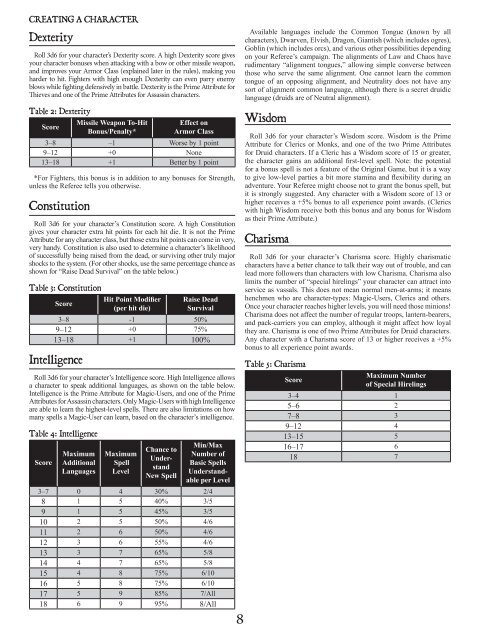Swords-Wizardry-Complete-revised
Swords-Wizardry-Complete-revised
Swords-Wizardry-Complete-revised
You also want an ePaper? Increase the reach of your titles
YUMPU automatically turns print PDFs into web optimized ePapers that Google loves.
Creating a character<br />
Dexterity<br />
Roll 3d6 for your character’s Dexterity score. A high Dexterity score gives<br />
your character bonuses when attacking with a bow or other missile weapon,<br />
and improves your Armor Class (explained later in the rules), making you<br />
harder to hit. Fighters with high enough Dexterity can even parry enemy<br />
blows while fighting defensively in battle. Dexterity is the Prime Attribute for<br />
Thieves and one of the Prime Attributes for Assassin characters.<br />
Available languages include the Common Tongue (known by all<br />
characters), Dwarven, Elvish, Dragon, Giantish (which includes ogres),<br />
Goblin (which includes orcs), and various other possibilities depending<br />
on your Referee’s campaign. The alignments of Law and Chaos have<br />
rudimentary “alignment tongues,” allowing simple converse between<br />
those who serve the same alignment. One cannot learn the common<br />
tongue of an opposing alignment, and Neutrality does not have any<br />
sort of alignment common language, although there is a secret druidic<br />
language (druids are of Neutral alignment).<br />
Table 2: Dexterity<br />
Missile Weapon To-Hit<br />
Score<br />
Bonus/Penalty*<br />
Effect on<br />
Armor Class<br />
3–8 –1 Worse by 1 point<br />
9–12 +0 None<br />
13–18 +1 Better by 1 point<br />
*For Fighters, this bonus is in addition to any bonuses for Strength,<br />
unless the Referee tells you otherwise.<br />
Constitution<br />
Roll 3d6 for your character’s Constitution score. A high Constitution<br />
gives your character extra hit points for each hit die. It is not the Prime<br />
Attribute for any character class, but those extra hit points can come in very,<br />
very handy. Constitution is also used to determine a character’s likelihood<br />
of successfully being raised from the dead, or surviving other truly major<br />
shocks to the system. (For other shocks, use the same percentage chance as<br />
shown for “Raise Dead Survival” on the table below.)<br />
Table 3: Constitution<br />
Hit Point Modifier<br />
Score<br />
(per hit die)<br />
Raise Dead<br />
Survival<br />
3–8 -1 50%<br />
9–12 +0 75%<br />
13–18 +1 100%<br />
Intelligence<br />
Roll 3d6 for your character’s Intelligence score. High Intelligence allows<br />
a character to speak additional languages, as shown on the table below.<br />
Intelligence is the Prime Attribute for Magic-Users, and one of the Prime<br />
Attributes for Assassin characters. Only Magic-Users with high Intelligence<br />
are able to learn the highest-level spells. There are also limitations on how<br />
many spells a Magic-User can learn, based on the character’s intelligence.<br />
Table 4: Intelligence<br />
Score<br />
Maximum<br />
Additional<br />
Languages<br />
Maximum<br />
Spell<br />
Level<br />
Chance to<br />
Understand<br />
New Spell<br />
Min/Max<br />
Number of<br />
Basic Spells<br />
Understandable<br />
per Level<br />
3–7 0 4 30% 2/4<br />
8 1 5 40% 3/5<br />
9 1 5 45% 3/5<br />
10 2 5 50% 4/6<br />
11 2 6 50% 4/6<br />
12 3 6 55% 4/6<br />
13 3 7 65% 5/8<br />
14 4 7 65% 5/8<br />
15 4 8 75% 6/10<br />
16 5 8 75% 6/10<br />
17 5 9 85% 7/All<br />
18 6 9 95% 8/All<br />
8<br />
Wisdom<br />
Roll 3d6 for your character’s Wisdom score. Wisdom is the Prime<br />
Attribute for Clerics or Monks, and one of the two Prime Attributes<br />
for Druid characters. If a Cleric has a Wisdom score of 15 or greater,<br />
the character gains an additional first-level spell. Note: the potential<br />
for a bonus spell is not a feature of the Original Game, but it is a way<br />
to give low-level parties a bit more stamina and flexibility during an<br />
adventure. Your Referee might choose not to grant the bonus spell, but<br />
it is strongly suggested. Any character with a Wisdom score of 13 or<br />
higher receives a +5% bonus to all experience point awards. (Clerics<br />
with high Wisdom receive both this bonus and any bonus for Wisdom<br />
as their Prime Attribute.)<br />
Charisma<br />
Roll 3d6 for your character’s Charisma score. Highly charismatic<br />
characters have a better chance to talk their way out of trouble, and can<br />
lead more followers than characters with low Charisma. Charisma also<br />
limits the number of “special hirelings” your character can attract into<br />
service as vassals. This does not mean normal men-at-arms; it means<br />
henchmen who are character-types: Magic-Users, Clerics and others.<br />
Once your character reaches higher levels, you will need those minions!<br />
Charisma does not affect the number of regular troops, lantern-bearers,<br />
and pack-carriers you can employ, although it might affect how loyal<br />
they are. Charisma is one of two Prime Attributes for Druid characters.<br />
Any character with a Charisma score of 13 or higher receives a +5%<br />
bonus to all experience point awards.<br />
Table 5: Charisma<br />
Score<br />
Maximum Number<br />
of Special Hirelings<br />
3–4 1<br />
5–6 2<br />
7–8 3<br />
9–12 4<br />
13–15 5<br />
16–17 6<br />
18 7


